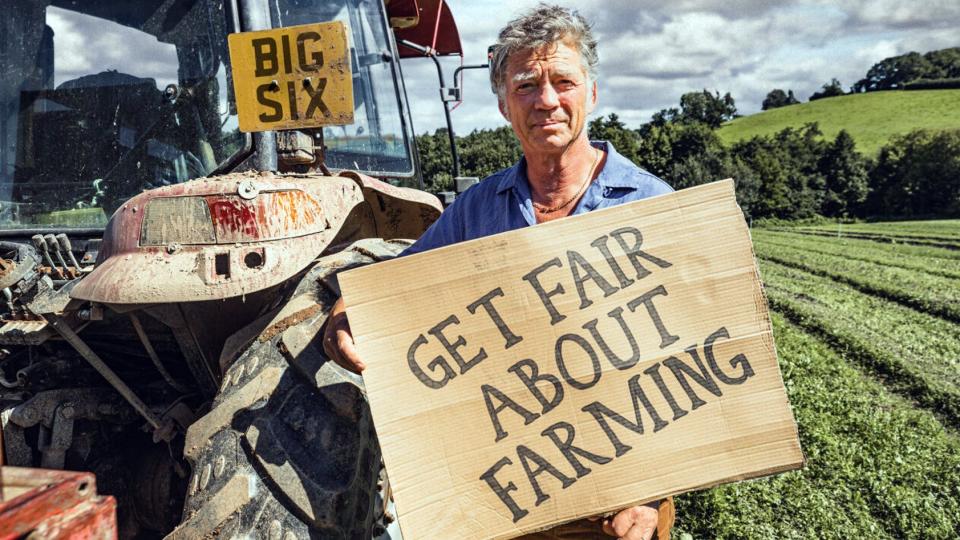Open letter to supermarket bosses warns farmers ‘struggling to survive’

Farming and food leaders have sent an open letter to the ‘big six’ supermarkets urging them to treat suppliers more fairly amid warnings British agriculture is “on its knees”.
The letter, sent to the chief executives of Tesco, Sainsbury’s, Asda, Morrisons, Aldi and Lidl, claims that the supermarkets’ buying practices are “all too often imbalanced, short term and wasteful” and leaving farmers “struggling to survive”.
Its more than 100 signatories include industry bodies Sustain and The Soil Association, chefs Rick Stein and Hugh Fearnley-Whittingstall, conservationist Ray Mears and TV presenters Julia Bradbury and Jimmy Doherty.
It reads: “Farmers are denied commitment or security – with whole crops rejected at the last minute in favour of cheaper options elsewhere, or just because supermarkets change their mind.
“Good food ends up rotting in the field. Farmers are left without payment for their crops. And without a stable, reliable income, they are struggling to survive.
“These practices threaten the livelihoods of hard-working farmers, and jeopardise the availability of fresh, healthy, and locally-grown food for shoppers. If farms continue to close, the British produce that customers know and love risks disappearing from your shelves altogether.”
One potato farmer said: “I’ve not grown for the major supermarkets for five years, and I would never go back. It cost me £25,000 to grow the crop – they just said ‘We don’t want them now’ – that was it, 60 metric tonnes of potatoes wasted.”
The farmer added: “There is no way I would grow for the supermarkets again. They’ll squash you to keep the prices down. You just don’t know how much to expect in terms of income, and at times you end up taking huge financial hits and wasting so much food. We need a fairer, shorter, and more transparent food chain.”
The letter is part of the Get Fair About Farming campaign launched by the Riverford Organic vegetable box firm, which is calling for reform of the grocery supply code of practice to better protect farmers, and sets out ‘charter principles’ for supermarkets, urging them to “pay what you agreed to pay, buy what you committed to buy, agree on fair specifications, commit for the long term and pay on time”.
Guy Singh-Watson, founder of Riverford Organic, said: “British Agriculture is on its knees, and that’s why most small family farms think that they’re not going to be in business the next generation. Is that what we want from our countryside? Is that what we want from our food system? Is that what we want from farmers? Farmers need to be treated fairly; they need some commitment from supermarkets.
“Sustainable trading relationships are based on co-operation, good communication and trust as much as competition. A brutal, short-term focus on annual price negotiations is supporting supermarket margins while destroying British farming along with the landscape, wildlife, and rural communities it once supported.
“Exploitation of family farms, the march to scale and the destruction of our countryside is not an inevitable result of a free market; it is driven by unbalanced trading relationships, deceitful marketing, externalised costs and a government that has abdicated responsibility in the hell-bent pursuit of cheap food at any cost. Given the information, all polls show the British public wants better and would even pay a little more if they knew it went to support better farming.”
Mr Singh-Watson said there was no need for fairer conditions for farmers to mean higher prices for customers.
“I don’t think food needs to be expensive. A bigger proportion of the price needs to go back to the farmer instead of processors and supermarkets,” he said.
Kath Dalmeny, chief executive of Sustain, the alliance for better food and farming, said: “Farmers and food suppliers need far better protection from unfair and sometimes abusive practices by the big supermarkets. Retailers make unreasonable demands, create waste, and keep too much of the value.
“Our own research shows that farmers and growers typically get less than a penny of the profit on packs of everyday foods. Many are thinking of leaving farming because it is such hard work for so little financial return, just when we need to increase production and consumption of sustainable fruit and veg. Government must step in and strengthen the rules so that more and better fruit and veg is available and affordable for all.”
Sue Pritchard, chief executive of the Food, Farming and Countryside Commission, said: “This call from Riverford highlights the precarious position of many farmers, especially smaller businesses working hard to provide citizens with healthy food grown in ways that don’t cost the earth.
“This is a critical moment for leadership from supermarkets who have the power and opportunity to help create a greener, healthier world.”
Andrew Opie, the British Retail Consortium’s director of food and sustainability, said: “Food retailers source, and will continue to source, the vast majority of their food from the UK, and work hard to pay a sustainable price to farmers.
“Retailers value their relationships with British farmers and are supporting them by paying more for their produce. However, retailers are also facing many additional costs and the recent Competition and Markets Authority report shows that they are working hard to absorb these in order to limit price increases for their customers. As a result, operating profit margins have fallen to less than 2p in every pound of sales.”
Tesco said it had long-standing relationships across its supply base and had recently agreed new long-term contracts with several key suppliers and growers, which helped to ensure costs were agreed ahead of the next growing season.

 Yahoo Finance
Yahoo Finance 